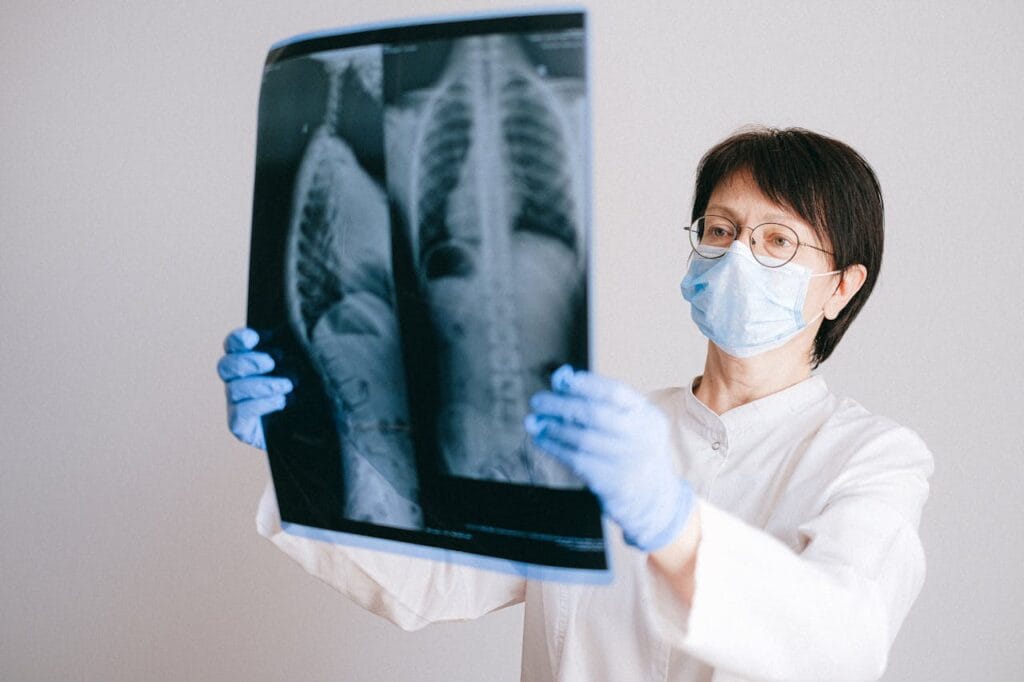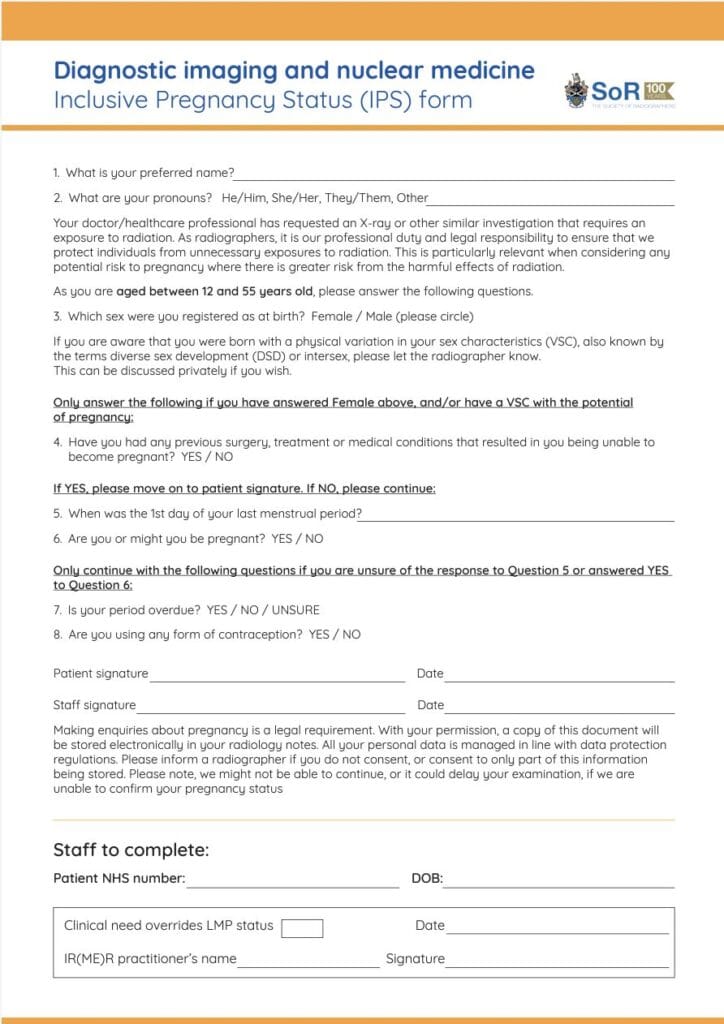In mid-August 2024, information circulated on the Internet that in the UK, according to new rules, radiologists must ask even male patients about pregnancy. We decided to check if this is true.
Many Russian media reported about the resonant innovation in the British healthcare system, for example, “Moskovsky Komsomolets", "Komsomolskaya Pravda", "Radio Sputnik", "Gazeta.ru", Russia Today, Lenta.ru, "Evening Moscow" And "Public television of Russia" The notes report that the new practice has already caused anger among male patients and even mass refusals of admission. Major Telegram channels shared the news: “Growth Crystal"(472,000 views at the time of writing this analysis), "Newsach / Dvach"(215,000), "Mousetrap"(147,000), "QC"(140,000), "Not Morgenstern"(130,000), etc. - as well as social network users ("VKontakte", X), blogging platforms And services questions and answers.
X-ray - one of the most common diagnostic methods. Due to the influence of electromagnetic radiation, it allows you to obtain a black and white image of the internal structure of a person. Despite the scary word "radiation", the doses of radiation to which the body is exposed are too small to cause serious harm, especially if this type of research is not abused and done only when necessary.
X-rays during pregnancy are considered completely safe for the fetus, if the reproductive organs are not exposed to radiation (for example, if the specialist takes pictures of the head, limbs or chest). However, when examining the abdomen or pelvic area of a pregnant woman, the fetus also receives some radiation dose, and theoretically it Maybe increase the risk of developing various pathologies or cancer in the unborn child. Although experts think Since such a scenario is extremely unlikely, they advise not to risk it and report pregnancy to your doctor. Firstly, he will be able to assess the feasibility of conducting the study at the moment, and secondly, if it is still necessary, he will be able to reduce the radiation dose during the X-ray and take other measures to minimize the impact on the fetus.
The same goes for computed tomography (CT) - another type of research using radioactive radiation. Despite the fact that with a CT scan the radiation dose is higher than with an x-ray, this procedure is considered completely safe for the fetus if it is not aimed at the abdominal cavity and pelvic organs of the pregnant woman. If these areas require examination, it is considered that the risk of developing cancer in the unborn child Maybe increase extremely slightly, but scientists do not have convincing evidence of even these risks. In any case, as with x-rays, the determining factor here is expediency, since refusal to conduct an examination can lead to more serious consequences for the health of the mother (and therefore the child) than radiation exposure during a CT scan.

The authors of many of the publications mentioned at the beginning of this analysis referred to an article in The Telegraph newspaper. On August 11, 2024, this British publication actually posted on its website article with the headline "NHS staff are instructed to ask men if they are pregnant before X-rays." The publication refers to some new recommendations that instruct radiologists in many hospitals in the United Kingdom to check whether patients of any gender between the ages of 12 and 55 are expecting a child. It is clarified that the regulations were changed after an incident when a transman, unaware of his pregnancy, underwent a CT scan. It is unknown whether this led to any consequences for the health of the fetus, but as part of the policy of inclusivity towards transgender, non-binary and intersex people, doctors were allegedly instructed to ask about pregnancy in any case, and not based solely on the patient’s appearance and verbal self-identification. As The Telegraph notes, the innovation led to a violent reaction from patients: men allegedly left the office in anger, and women cried because of questions about their fertility. The text of the article clarifies that the new guide in question was developed by the British Society of Radiologists (SoR) is the professional organization for diagnostic imaging and radiotherapy professionals. However, later the publication’s interlocutor at the NHS noted that the use of this guidance in healthcare institutions is not mandatory.
The next day, August 12, SoR posted on its website answer for publication by The Telegraph. Representatives of the public described the article as offensive and transphobic and, with references to legal acts, noted that they are required by law to find out about the possible pregnancy of patients in order to reduce the risk of harmful effects on the fetus. The SoR statement notes that if a patient indicates on the questionnaire that he was born male, it is obvious to any radiologist that there is no need to ask him a question about pregnancy. If at birth the patient’s sex was determined to be female, then the doctor should tactfully find out if he is pregnant, and, if necessary, inform him about the risks and discuss the need for research.
The manual in question is not new - SoR published it back in 2021. Attached to the document is a form questionnaires, it is asked to be completed by each patient who is prescribed an x-ray. The first and second questions are about how the doctor should address the visitor and what pronouns to use. The third is what gender the patient was assigned at birth, and only patients between the ages of 12 and 55 need to answer this question. There are two possible answers: male and female. The same paragraph of the questionnaire specifies: “If you know that you were born with a physical variation in sexual characteristics or intersex variation, notify the radiologist." In intersex people, due to genetic disorders, the structure of the genitals may not fit into the binary idea of female and male genital organs - for example, they may have both of different degrees of development. Some intersex people who identify as male still have sufficiently developed female reproductive organs to be able to conceive.

The fourth question of the questionnaire is asked to answer only those who in the previous paragraph indicated either female sex at birth or an intersex variation with the ability to become pregnant. Such patients are asked to report whether they have had any surgery or other medical interventions in their lives that could affect their ability to have children. If the answer is negative, you need to provide a number of more data to establish the possibility of pregnancy at the moment. If the patient was born a man, then no matter how he identifies himself at the moment (men who have made a transgender transition are also unable to get pregnant), all questions after the third do not apply to him and are not required to be answered. This clarification is in bold and underlined.
Following criticism from SoR, journalists from The Telegraph updated your article. The text itself, however, remained the same, but the headline was changed to “Men asked to fill out pregnancy form before x-ray in NHS settings.” They also added a clarification at the end of the post: “An earlier version of this article reported that NHS radiologists were instructed to ask men if they were pregnant before carrying out scans. All patients are asked to complete a pregnancy form, but if they state that they were registered as male at birth, they are not asked about actual or possible pregnancy (except in rare cases where they have relevant physical variations in sex characteristics).” At the same time, the Russian media and bloggers mentioned at the beginning of the analysis, who published articles and posts with loud headlines with reference to the publication of The Telegraph, did not release any updates.
So in at least some hospitals in the UK, men are actually asked to fill out a questionnaire asking about the possibility of pregnancy before having an X-ray. However, one of her first points is the question of the patient’s sex at birth. If he is male, this becomes the last question for the person filling out. All further items designed to establish the likelihood of pregnancy apply only to those whose sex at birth was recorded as female, and to people with intersex variation who are theoretically capable of becoming pregnant.
Cover photo: pexels.com
Read on the topic:
- Factcheck.kz. Is it true that British doctors are required to ask men about their pregnancies?
- Is it true that ultrasound during pregnancy is dangerous for the fetus?
- Is it true that MRI, X-ray, CT and fluorography are dangerous to health?
- Is it true that male lactation pills are being advertised in the UK?
If you find a spelling or grammatical error, please let us know by highlighting the error text and clicking Ctrl+Enter.






